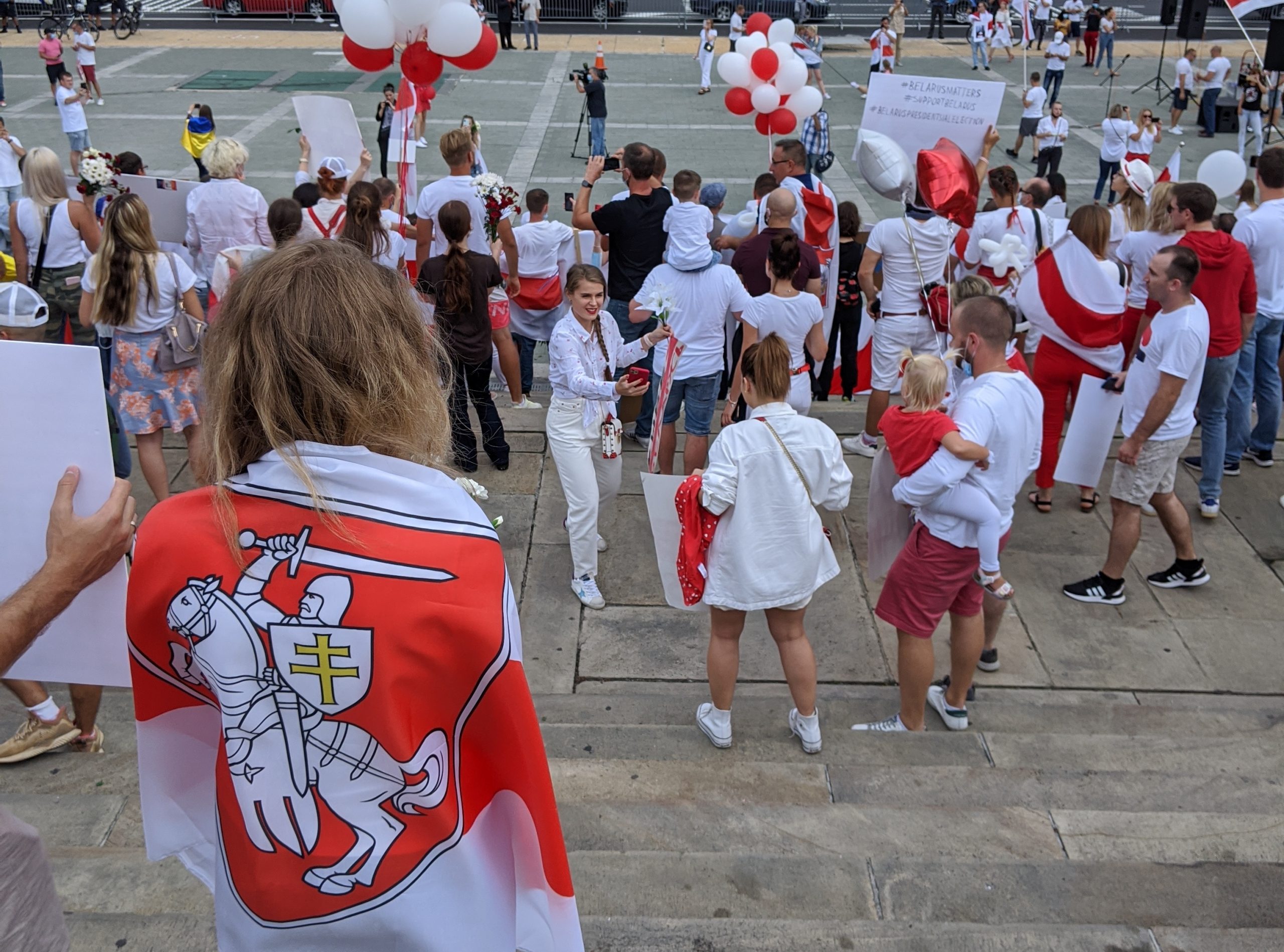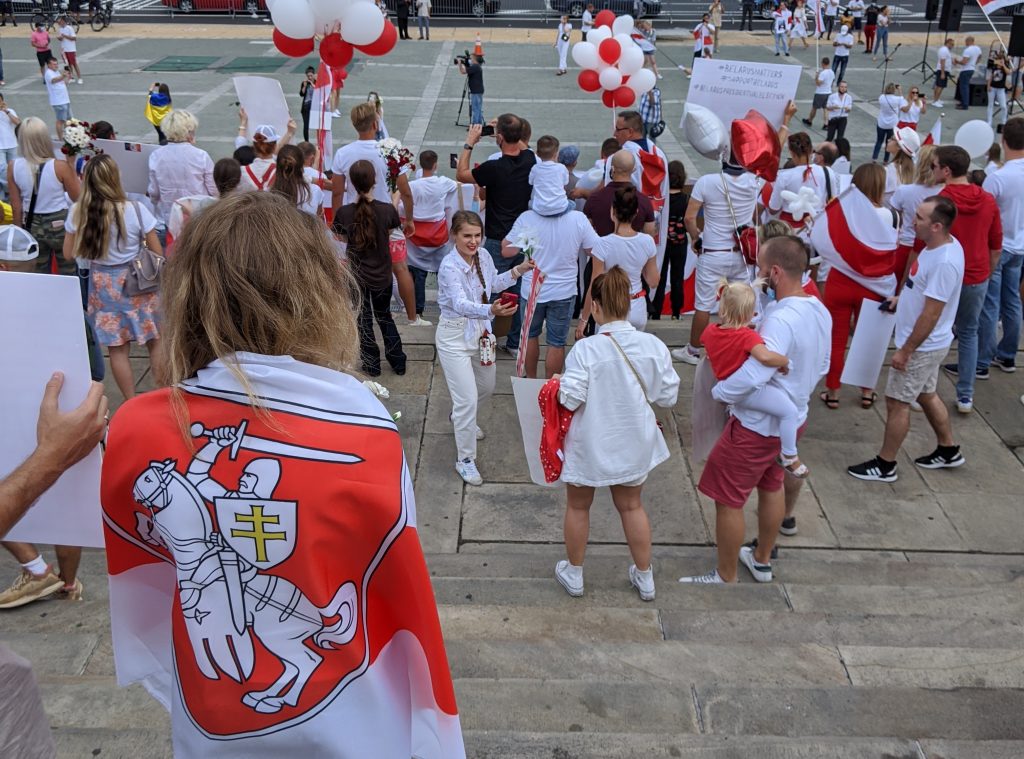
Sometimes, a musical collaboration comes out at the right time. Even if the reason isn’t the greatest.
Such is the case with Slavalachia, a “cross-cultural collaboration of folk musicians from Belarus, Ukraine and [the] Appalachian region of [the] USA.” The band, fusing elements of the three cultures’ traditional folk music, came together last March.
The musicians Siarhei Douhushau and Vuraj represent Belarus, Ohio-based Brother Hill and the Hill Spirits represent Appalachia, and Marichka Chichkova and Torban represent Ukraine.
“I invited Belarusian traditional musicians to perform and then they jammed, like, 7 hours in a row, mixing Belarusian and Appalahican tunes together,” said Nadzeya Ilkevich, Slavalachia’s executive producer. “We made a trip to Belarus in January—and Ukraine—and then a Ukrianian band joined us.”
Ilkevich, from Belarus, found her way to Ohio University in Athens, and earned a master’s degree in communication and development studies in May 2019. She won a scholarship for cultural activism in Belarus, which brought her to America. One of her projects in Athens was to transform the “pocket park” uptown beside the old Armory building.
“I had no idea about Appalachia when I came here,” she said. “No one in Belarus and Ukraine has any idea about Appalachia…we are spreading the word about this region, which also has a complicated history, as we are.”
The background of the artists sparked the name of the project.
“The name also was born like, somewhere in-between jams,” Ilkevich said. “We are considering it’s like a new territory that exists beyond all the real countries. So it’s like our family and our new forged territory of Slavalachia.”
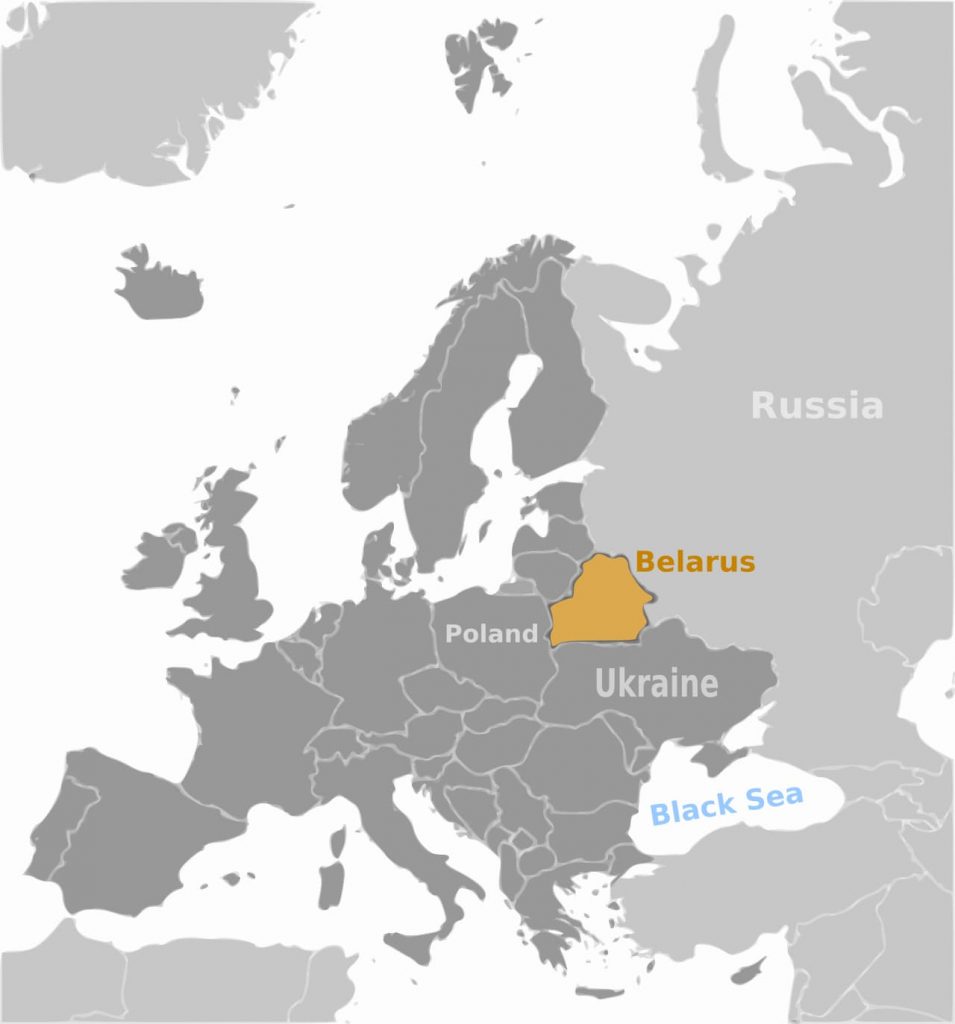
Ilkevich isn’t the first person to see a link between the Appalachians and the Carpathian Mountains, which run through western Ukraine and Romania. Berea College’s Loyal Jones Appalachian Center has called them “kindred lands” for their economic similarities, and other scholars have noted overlaps in the regions’ agriculture and town-building in valleys. Now, Ilkevich and Slavalachia have noted their musical similarities.
Preserving traditional music has also overlapped. Rather than follow the Ukrainian government’s interpretation of “traditional” music—which Ilkevich called “awful, sometimes”—that focused on Soviet-era nostalgia, Ukrainian and Belarusian musicians have gone into the countryside to collect songs from elderly villagers. The folklorist and ethnologist Alan Lomax did much the same in the southern Appalachians. The melodies and tunes recorded in both places have been preserved for centuries or more, in some cases.
Those traditional songs provide fertile creative ground.
“We want to inspire people to experiment and to respect traditions, and not to be afraid to create something new out of their roots,” Ilkevich said. “We will use some parts of traditional music from both countries, but then, the most interesting thing is what will [be] born from this crossroads.”
For example, as Slavalachia experimented, they found that some Appalachian tunes “overlaid perfectly” with Ukrainian tunes. Sometimes, all it took was a willingness to try.
In the future, Slavalachia wants to produce an album, a documentary, and go on tour. COVID-19 has delayed those plans, but hasn’t forced Slavalachia to cancel them. Their first release, a three-language rendition of “Which Side Are You On?”, was recorded separately in the United States, Belarus, and Ukraine.
Slavalachia chose to release “Which Side Are You On?” as a sign of support for Belarusians, who have protested for two weeks—the largest political gatherings against the government in decades. After Alexander Lukashenko, who has held power in Belarus since 1994, declared a landslide election victory, protesters cried foul. Sviatlana Tsikhanouskaya, the main opposition candidate, read what many believed to be a forced statement that declared Lukashenko the winner, and then fled to Lithuania. The government had shut down the internet to quell protests and control information, though it was reinstated a few days later.
Many have been brutally beaten. Thousands have been arrested. Two protesters have been killed by police.
Yet crowds of protesters have grown. On a visit to a factory on Monday, Lukashenko was heckled by workers. State television and radio workers have resigned or gone on strike. And media outlets like Nexta and Belsat, founded by Belarusians and Poles, respectively, have tried to broadcast videos of the protests beyond Belarus—and verify them. American-based and British-based journalists have paid more attention in recent days, sometimes giving personal accounts they would have preferred not to give. Dan Peleschuk of Buzzfeed News spent two days in prison, arrested during protests:
I scanned my fellow cellmates. Beaten faces and shirts stained orange from day-old blood. Knees split open, oozing from infection. Baton-shaped bruises across backs. Yet except for the youngest among them, who were between 18 and 20 years old, few were visibly afraid.
Over the next day-and-a-half in that musty, oxygen-deprived cell—packed with students, techies, small business owners, and blue-collar workers—inmates traded stories about how their arrest sheets had been fabricated to claim they’d been shouting slogans or inciting protests. Most had been picked off the street like me; some right front of their homes.
Angry but not radical, they referred to cops in street slang meaning “trash.” But they also waxed poetic about being fed up with economic stagnation and being treated like cattle.
The size of the protests, and the brutality relied on by the Belarusian government to maintain control, has attracted more international scrutiny. In the past, political repression in Belarus attracted little notice beyond media outlets focused on eastern Europe. For now, that has changed.
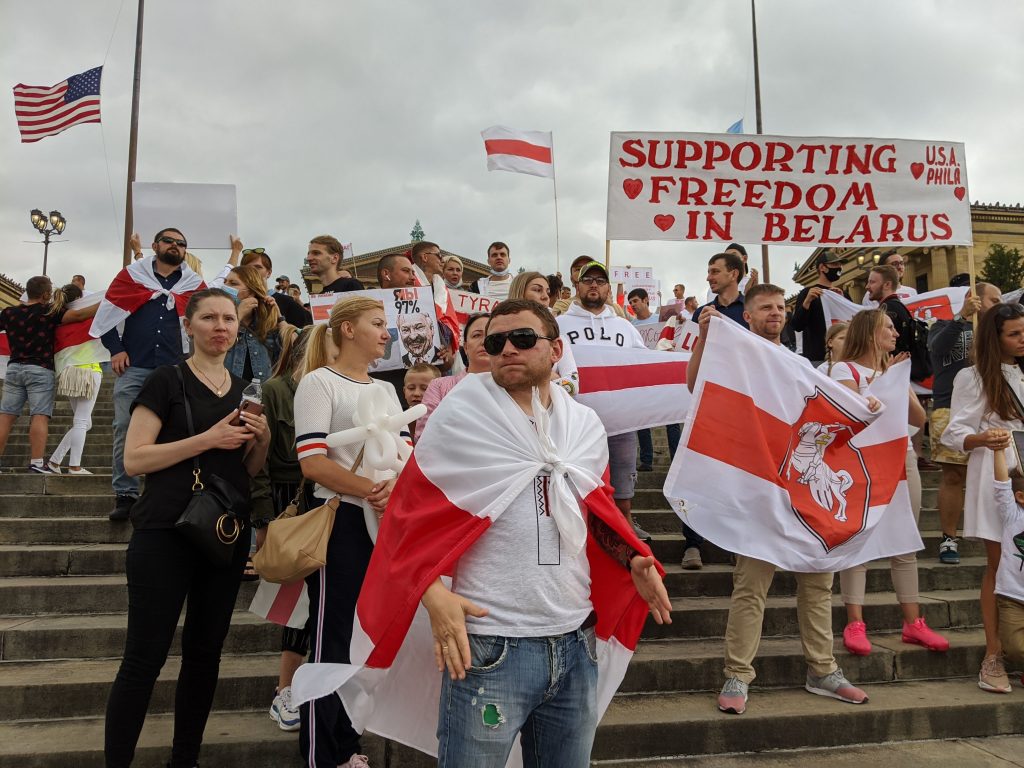
In Philadelphia, the Belarusian community gathered on Sunday in solidarity with the protesters back home. Hundreds turned out to educate the public on what’s happening and share their concern. The mood was optimistic—after almost three decades of one-man authoritarian rule, a national outcry has broken out, and it’s gone international.
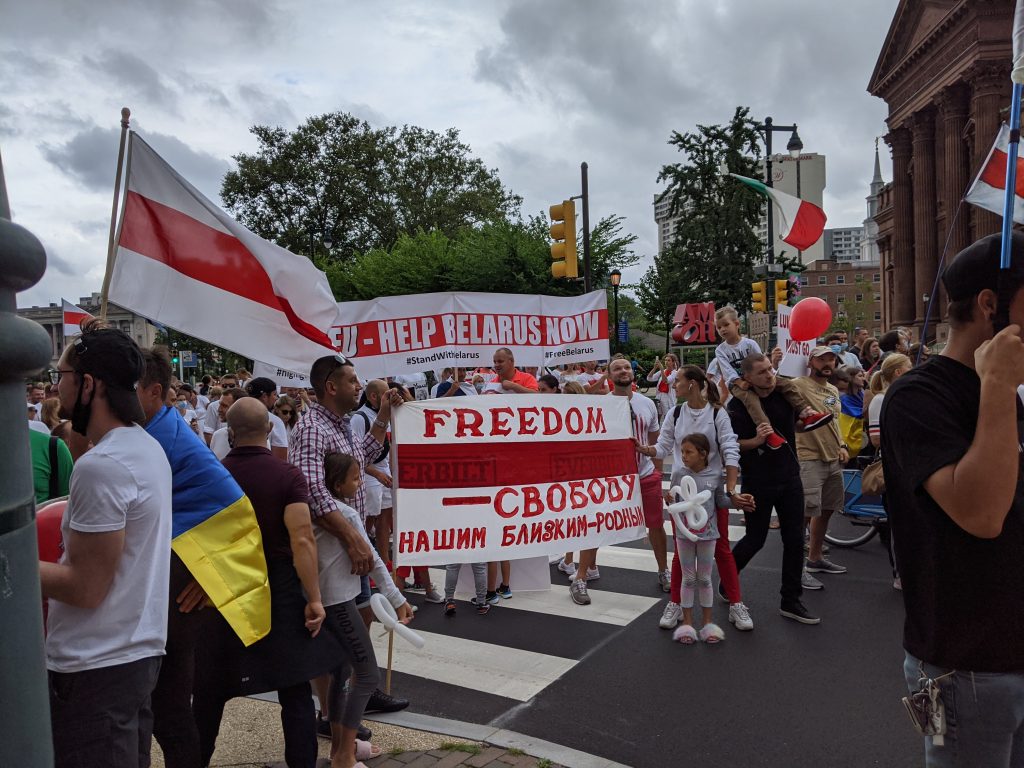
“The world should pay attention because it’s like, how to say…it’s important to share information and to express support for the Belarusian people because they don’t have internet connection…so that they are not alone,” Ilkevich said. “What they’re doing is right. Because we had 26 years of dictatorship and this is brutal violence from the government side.”
With Slavalachia’s project, there’s hope that the cultural value of Belarus will be more widely acknowledged—not just its political situation of the moment.
Subscribe to The Patch, our newsletter, to stay up-to-date with new expatalachians articles and news from around Appalachia.
Anthony Hennen is managing editor of expatalachians and managing editor of the James G. Martin Center for Academic Renewal in Raleigh, North Carolina.

